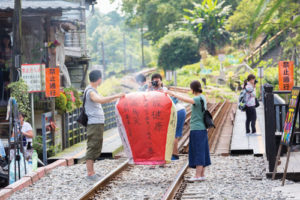With Taiwan’s tourism suffering from plummeting Chinese arrivals, the government has thrown a lifeline to affected businesses.
 Taiwan was seeing steadily surging arrivals from China in recent years until a political stalemate between Taipei and Beijing sent arrivals in a nosedive. This was allegedly due to a politically-motivated move in Beijing to limit the flow of Chinese tourists to certain parts of Taiwan after new president Tsai Ing-wen – who does not endorse the ‘one China’ policy – took office.
Taiwan was seeing steadily surging arrivals from China in recent years until a political stalemate between Taipei and Beijing sent arrivals in a nosedive. This was allegedly due to a politically-motivated move in Beijing to limit the flow of Chinese tourists to certain parts of Taiwan after new president Tsai Ing-wen – who does not endorse the ‘one China’ policy – took office.
According to statistics from Taiwan Tourism Bureau (TTB), Chinese traffic grew 30 per cent in March 2016 but the figures abruptly plunged 12.2 per cent in May when the Taiwan’s new ruling party took over on May 20. In the first 10 months of 2016, only 3.1 million Chinese travelled to Taiwan, representing a 11.7 per cent year-on-year decrease.
The Chinese slump sent Taiwan’s tourism sector into turmoil as it affected the livelihood of those employed in the sightseeing sector. Over 20,000 industry members from across 200 travel companies then took to the streets in September to call on the government with ways to improve the situation.
TTB has announced NT$300 million (US$9.4 million) in subsidies to help affected tour operators design discounted packages for domestic tourists. These will be targeted at seriously-affected areas including Jiayi, Hualien, Taoyuan, Kaohsiung, Taitung, Nantou and Pingtung, etc.
The bureau has also put forth four key directions to help affected stakeholders, namely to diversify the market, assist transformation of business, expand domestic travel and develop creative products to retain Chinese visitors.
Some players such as Phoenix Tour general manager, Benjamin Pien, see the crisis as an opportunity to wean the tourism industry from one that is too dependent on Chinese tour groups and riddled with cut-throat prices.
The company no longer handles group tours from China and has shifted its focus to providing tailor-made tour products for premium Chinese visitors, although this accounts for only two per cent of overall business, he added.
Taiwan Tour Bus, operator, Chao Tung-yuan also noted that the protest in September was mostly made up of business in the zero-fee tour field like coach buses and operators. He said: “I think (the demonstration) was of no use since the market regulates itself. But in this case, it (has to do) with government policy and I believe the situation will improve in future.”
This article was first published in TTG Asia February 2017 issue. To read more, please view our digital edition or click here to subscribe.




















